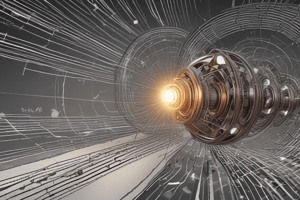Podcast
Questions and Answers
What is the unit of work done?
What is the unit of work done?
- Meter per second
- Joules (correct)
- Watts
- Newtons
What is the formula to calculate kinetic energy?
What is the formula to calculate kinetic energy?
- K = m × v
- K = m × v^3
- K = m / v
- K = 1/2 × m × v^2 (correct)
What is the type of energy when force and displacement are in opposite directions?
What is the type of energy when force and displacement are in opposite directions?
- Zero work
- Positive work
- Negative work (correct)
- Thermal energy
What is the law that states energy cannot be created or destroyed?
What is the law that states energy cannot be created or destroyed?
What is the definition of power?
What is the definition of power?
What is the formula to calculate gravitational potential energy?
What is the formula to calculate gravitational potential energy?
Flashcards are hidden until you start studying
Study Notes
Work
- Definition: Work is the transfer of energy from one object to another through a force applied over a distance.
- Formula: W = F × d × cos(θ)
- W: work done
- F: force applied
- d: distance over which the force is applied
- θ: angle between the force and displacement vectors
- Units: Joules (J)
- Types of work:
- Positive work: force and displacement are in the same direction
- Negative work: force and displacement are in opposite directions
- Zero work: force and displacement are perpendicular
Energy
- Definition: Energy is the ability to do work.
- Types of energy:
- Kinetic energy (K): energy of motion
- Formula: K = 1/2 × m × v^2
- m: mass
- v: velocity
- Formula: K = 1/2 × m × v^2
- Potential energy (U): energy of position or stored energy
- Formula: U = m × g × h (gravitational potential energy)
- m: mass
- g: acceleration due to gravity
- h: height
- Formula: U = m × g × h (gravitational potential energy)
- Thermal energy (Q): energy of heat
- Electrical energy (E): energy associated with electric charges
- Chemical energy (E): energy stored in chemical bonds
- Kinetic energy (K): energy of motion
- Law of conservation of energy: energy cannot be created or destroyed, only converted from one form to another
Power
- Definition: Power is the rate at which work is done or energy is transferred.
- Formula: P = W / t
- P: power
- W: work done
- t: time over which the work is done
- Units: Watts (W)
- Types of power:
- Instantaneous power: power at a given instant
- Average power: power over a period of time
- Examples of power:
- Mechanical power: power transmitted through mechanical systems
- Electrical power: power transmitted through electrical circuits
Studying That Suits You
Use AI to generate personalized quizzes and flashcards to suit your learning preferences.




